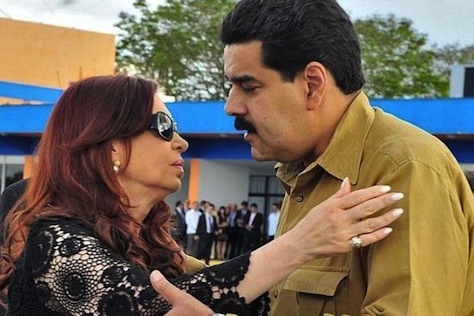I write tomorrow for The National Interest about the dual economic crises in Venezuela and Argentina.![]()
![]()
The similarities between the two economic crises are uncanny — inflation, capital controls, dollar shortages, overvalued currencies, shortages, etc.
But the similarities don’t stop there. Both countries currently fee political limitations to force policy changes to avert crisis — and that limit the political capital of the leaders of both countries, Venezuelan president Nicolás Maduro and Argentine president Cristina Fernández de Kirchner, to enact reforms:
Accordingly, normal political channels seem blocked through at least the end of 2015, despite the fact that both countries should be considering massive economic policy u-turns that will require significant amounts of political goodwill neither Maduro nor Fernández de Kirchner possess. But there’s an even greater inertia lurking beyond even the routine political impasse—a kind of political dead-hand control in both countries, on both a short-term and long-term basis.
First, both Venezuela and Argentina remain tethered to the political ideologies of chavismoand kirchnerismo, even though their proponents, Chávez and Néstor Kirchner, are now dead. Those policies may have worked over the last decade to achieve certain goals, including greater social welfare and poverty reduction in Venezuela and a rapid return to economic growth and competitive exports for Argentina. But it should be clear by now that chavismoand kirchnerismo are unable to provide answers to their respective countries’ economic woes today.
Even more broadly, I argue that beyond the shortcomings of chavismo and kirchnerismo, Venezuela faces a long-term resources curse and Argentina faces the long-term legacy of protectionism and statism of peronismo, which in each case underlie the current economic crises. What’s more, the IMF-sponsored reforms in 1989 that led to the massive Caracazo riots in Venezuela and the IMF-approved lending tied to Argentina’s 1990s ‘convertibility’ crisis that led to the 1999-2001 peso crisis have undermined orthodox economic policymaking:
What’s more, ill-conceived attempts to rupture those dominant paradigms through orthodox ‘Washington consensus’ reform processes led to economic and political disaster. In both countries, leaders experimented with neoliberalism, facilitated by the misguided zeal of the International Monetary Fund, without enacting any corresponding safety nets or shock absorbers. The resulting crises led both countries to double down on their prevailing ideologies, thereby, ironically, making economic reform today even more difficult.
In both cases, the political, historical and economic legacies have prevented the broadly moderate, business-friendly, social democratic middle courses that much of the rest of South America has embraced to wide success, including Colombia, Peru, Chile, Brazil.
